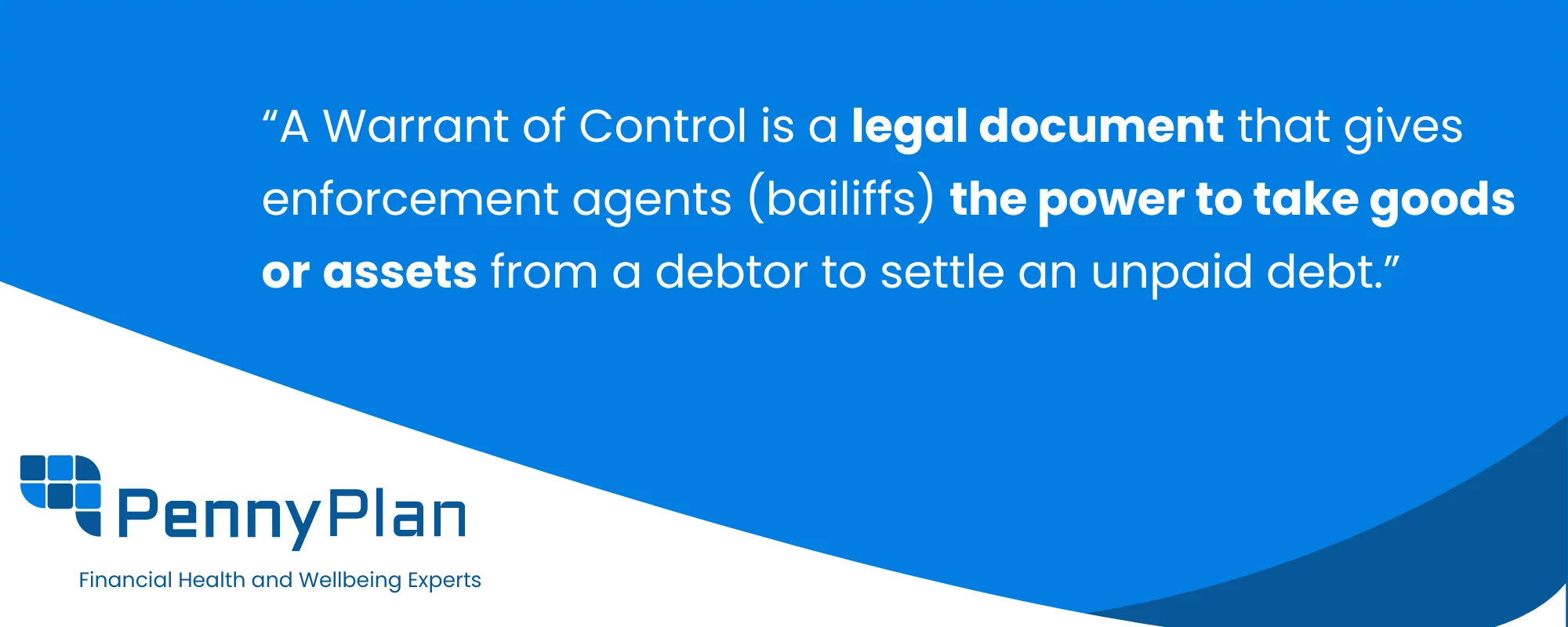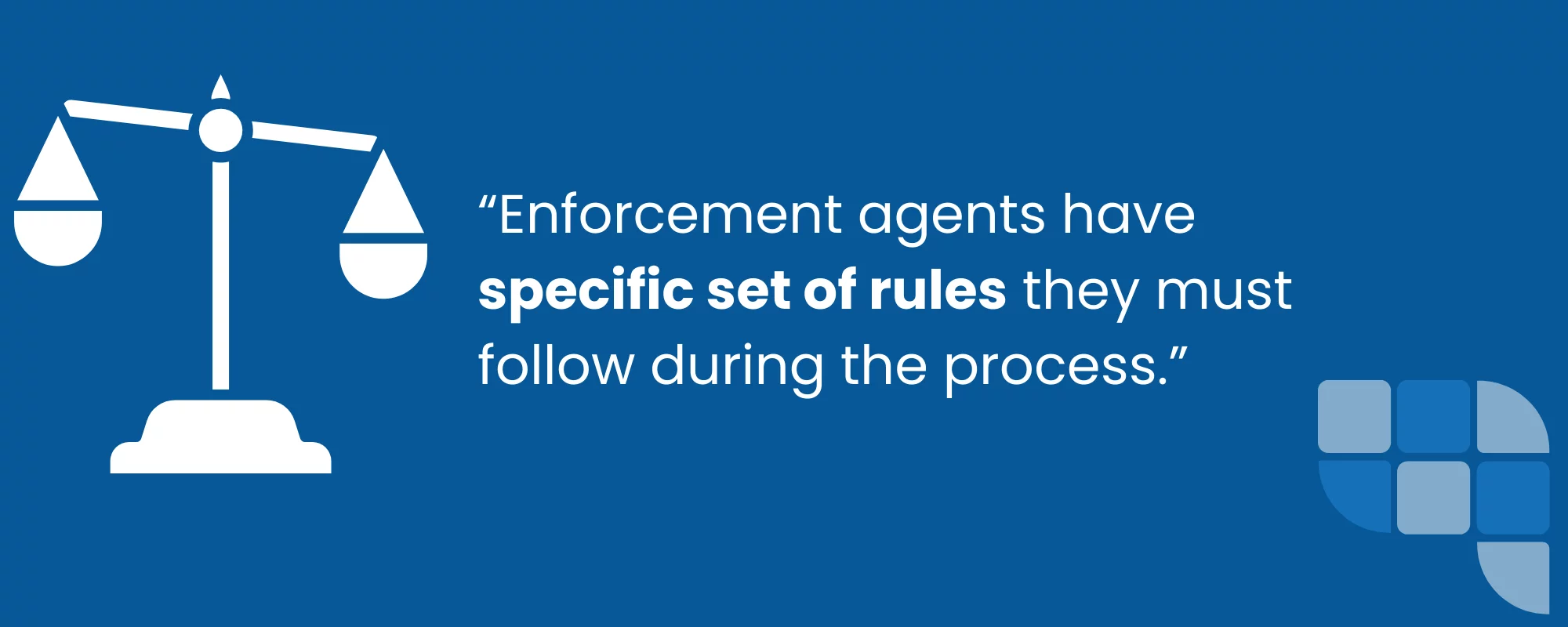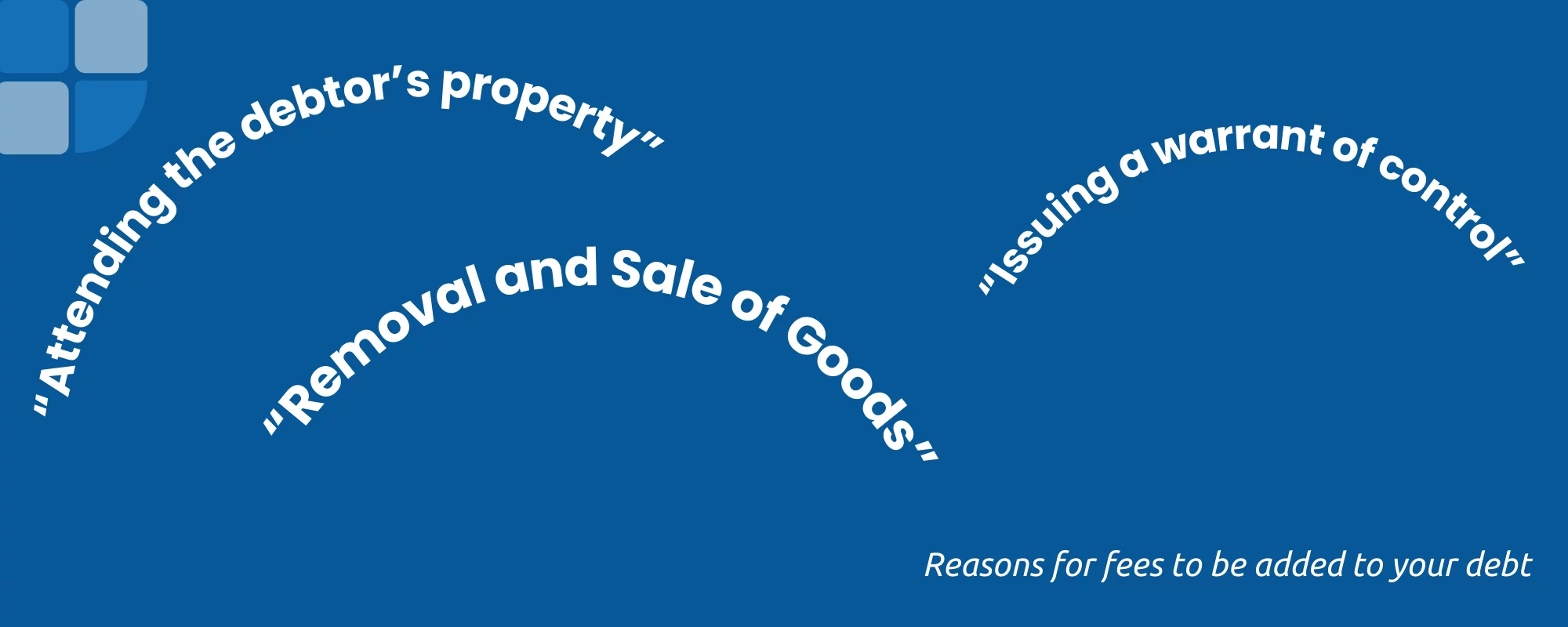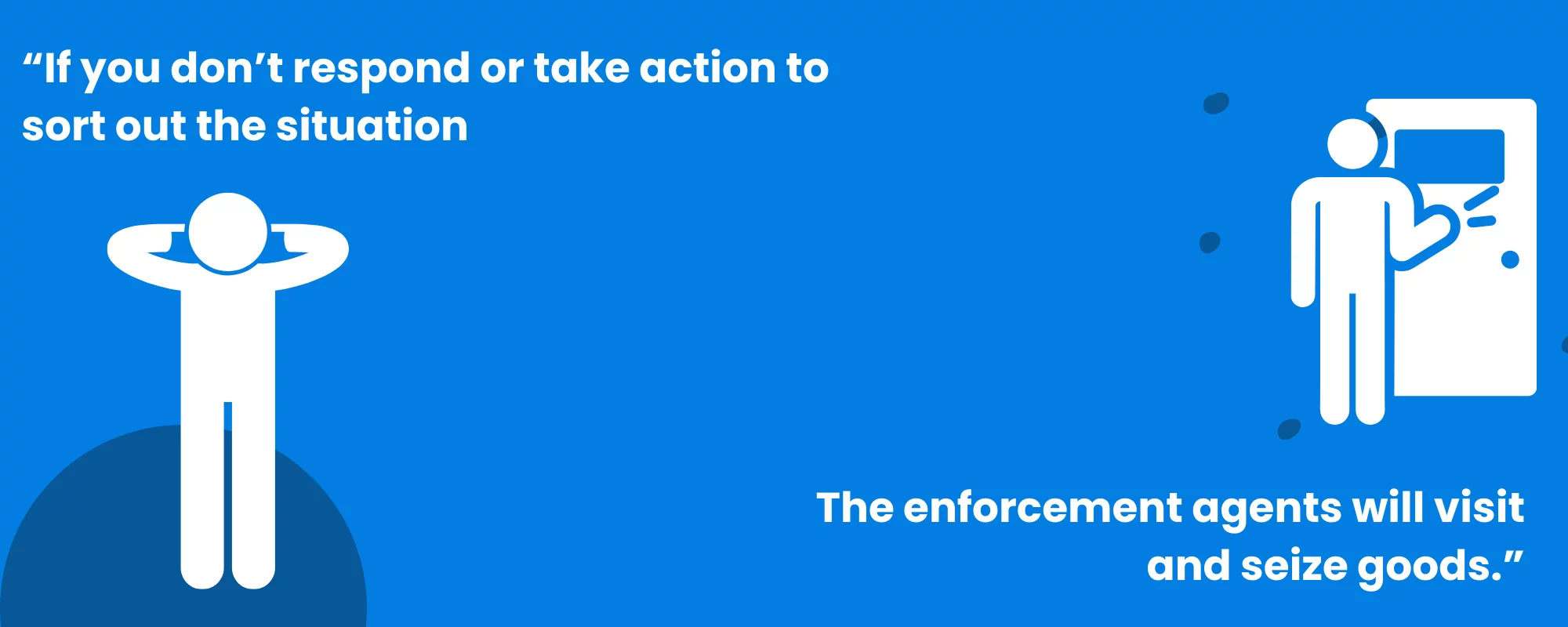In debt recovery, a Warrant of Control is a legal tool used to enforce payment of a debt when all else has failed.
If you’re going through this process or just want to understand it better, this guide will walk you through everything you need to know.
We’ll explain what a Warrant of Control is, how it works, who can issue it, and your rights.
Whether you’re a creditor or a debtor, this information is crucial to navigating the world of debt enforcement.
What is a Warrant of Control?

A Warrant of Control is a legal document that gives enforcement agents (bailiffs) the power to take goods or assets from a debtor to settle an unpaid debt.
It’s one of the most severe debt enforcement methods used by creditors after they’ve been granted a County Court Judgment (CCJ) or other court orders that the debtor hasn’t paid.
A Warrant of Control aims to recover the debt by taking and selling goods belonging to the debtor to pay off the outstanding amount.
Bailiffs can’t take debt protected under the Consumer Credit Act, such as credit cards and payday loans.
While the thought of enforcement agents turning up at your door may seem scary, it’s important to understand the process and your rights before and after a warrant is issued.
County Court Bailiffs

County court bailiffs play a key role in the debt recovery process. They enforce county court judgments (CCJs) and collect debts on behalf of creditors.
Working for HM Courts and Tribunals Service, they are accountable to the delivery manager of the county court hearing centre from which they operate.
Their main job is to visit debtors’ homes or businesses to take goods which are then sold at auction to recover the debt.
A county court bailiff has the power to take control of goods belonging to the debtor but they must follow strict rules and guidelines.
They can’t take essential items such as food, clothing and medication so debtors are left with enough goods to meet their basic needs.
This balance of power and regulation ensures the debt recovery process is fair and within the law.
How does a Warrant of Control work?

The process of getting and executing a Warrant of Control follows these steps:
1. County Court Judgment Application
When a creditor has a CCJ against a debtor but hasn’t received payment, they can apply to the court for a Warrant of Control.
This application gives them the legal power to recover the debt through enforcement.
2. Issue of Warrant
Once the court grants the warrant, enforcement agents can take action.
The court will notify the debtor by serving an enforcement notice, which will detail the debt.
The notice will give them 7 days to settle the debt and let them know that enforcement agents will visit their property if they don’t settle the debt within that time.
3. Bailiffs Visit
If the debt isn’t paid, a bailiff’s visit will occur.
During this visit, enforcement agents will visit the debtor’s property to take control of goods that can be sold to pay the debt.
They can’t enter the property by force unless they have permission or certain circumstances apply, such as a previous controlled goods agreement.
4. Seizure and Sale of Goods
The goods taken by the enforcement agents can be sold at auction to collect the money owed and pay the debt.
The matter is settled if the sale of the goods pays the debt in full, including the creditor’s costs.
If not, further action may be required to recover the balance outstanding.
Who issues a Warrant of Control?

A Warrant of Control can only be issued by a County Court when a creditor applies for it after a CCJ.
The creditor must provide evidence that the debtor has not complied with the court order.
Once the warrant is granted, court-appointed enforcement agents can act on behalf of the creditor.
It’s worth noting that not anyone can apply for a Warrant of Control. Only creditors with a legal claim through a court order can apply for it.
This ensures the use of enforcement agents is legitimate and follows due process.
County court bailiffs work under the authority of the court to enforce debt collection, including taking goods from properties for unpaid debts and must follow specific rules when visiting homes.
What happens when a Warrant of Control is issued?
Once a Warrant of Control is issued, the court will notify the debtor, giving them a final chance to pay the debt before the enforcement agents take action.
This notice is called an “Enforcement Notice” and will include:
• The total amount of debt owed, including any interest and court fees
• A seven days’ deadline to pay the debt (excluding Sundays, bank holidays and Christmas Day)
• What will happen if the debt isn’t paid
If the debtor doesn’t respond within the time specified, enforcement agents will visit their property to take control of the goods.
What Bailiffs Can and Can’t Do

Enforcement agents have specific rules they must follow during this process:
What they can do
Bailiffs can take control of goods inside the debtor’s home and vehicles, and other assets.
They can enter the debtor’s property peacefully through an open door. They can also take control of goods outside the property like cars parked on the street.
What they can’t do
Bailiffs can’t force entry into a property unless specific circumstances apply, such as collecting unpaid fines. They must first try to enter peacefully.
Bailiffs can force entry into certain situations, such as business premises or after a warrant of control.
However, they can’t take essential or basic household items, like cooking appliances or bedding and must follow strict rules about the type and value of goods they seize.
Fees

When dealing with county court bailiffs, you should be aware of the applicable fees and charges.
These can include:
Fee for issuing a warrant of control
Fee for attending the debtor’s property
Fee for removing and selling goods
These fees can add up fast, so debtors need to know what’s involved.
Bailiffs can only charge “reasonable expenses” as they see fit, and debtors have the right to dispute any fees they think are excessive. Knowing these charges will help debtors manage their finances better and avoid unexpected costs.
How can you stop or challenge a Warrant of Control?

Debtors have several options to stop or challenge a Warrant of Control. Act fast to avoid enforcement:
1. Pay the debt in full:
The easiest way to avoid enforcement is to pay the debt in full, including any additional fees and interest. This will stop the warrant process immediately.
2. Negotiate a payment plan:
Sometimes, debtors can negotiate a payment plan with the creditor or bailiffs. If both parties agree on payment offer and a repayment schedule, enforcement may be delayed or stopped.
Certain debt solutions can also help, such as Individual Voluntary Arrangements or Debt Management Plans.
3. Apply for a Stay of Execution:
If the debtor can’t afford to pay, they can apply to the court for a stay of execution.
This is a legal process that asks the court to suspend the warrant. The debtor will need to prove financial hardship and offer an alternative repayment plan.
4. Challenge the Warrant:
Debtors can challenge a Warrant of Control if they think it was issued unfairly or incorrectly.
For example, if the debt has already been paid or if there’s an issue with the judgment, the debtor may ask the court to review the warrant.
What if you don’t respond?

Not responding to a Warrant of Control can have serious consequences.
If the debtor doesn’t respond or take action to sort out the situation, the enforcement agents will visit and seize goods.
Inaction will result in:
• Loss of personal belongings and assets
• Additional court fees and enforcement charges added to the original debt
• Further legal action, which can lead to bankruptcy or insolvency if the debt is not resolved
Debtors in this situation should seek professional debt advice as soon as possible.
FAQs
Can I negotiate with bailiffs once a Warrant is issued?
Yes, in some cases you can negotiate with enforcement agents for more time to pay the debt or to agree a payment plan. But act fast before they start taking control of your goods.
Will my possessions be taken straight away?
No, enforcement agents have to give you notice before they visit your property.
You have at least 7 days from the notice being issued to pay the debt or negotiate an arrangement.
Enforcement agents can force entry only in certain circumstances and they have to follow strict rules and regulations.
Can bailiffs take my car?
Yes, enforcement agents can take control of your car if it’s on your property or nearby.
But if the vehicle is essential for your job or daily living (e.g. a mobility vehicle) you may be able to apply to have it exempt from seizure.
A high court enforcement officer serves enforcement notices and has the legal authority through documents like a warrant of control to recover debts which may include seizing vehicles.
What can bailiffs not take?
Bailiffs can’t take essential household items like your cooker, fridge or bedding.
They can’t seize items that belong to someone else or items necessary for your job (up to a certain value).
A high court writ is a legal document that authorises enforcement actions to recover unpaid debts and allows enforcement agents to take control of a debtor’s possessions to encourage payment.
Can Bailiffs Force Entry?
A bailiff cannot force entry to collect money owed and must try to enter the premises peacefully.
They can, however, gain entry in certain instances, such as a business address or warrant of control.
A warrant authorises enforcement agents to recover goods under the controlled goods agreement outside of basic household items such as cooking appliances.
Complaints about County Court Bailiffs
If you’re unhappy with how a county court bailiff has behaved, you can file a complaint.
Start by writing to the delivery manager of the County Court hearing centre where the bailiff works.
Your complaint should include specific details of the bailiff’s behaviour and any evidence to support your case.
Also, the Citizens Advice Bureau and National Debtline can offer advice on bailiffs and making complaints.
Remember bailiffs are subject to the “Taking Control of Goods: National Standards” which are good practice guidelines.
These standards can be used to challenge any behaviour you feel is unfair or unreasonable and to protect your rights throughout the debt recovery process.
Conclusion
Facing a Warrant of Control can be scary, but understanding the process and your rights is key to resolving it.
If you’re having a debt being enforced against you, act fast and seek advice if needed.
Our debt advice team at PennyPlan is friendly, non-judgmental, and, most of all, quick to help you get the answers you need to deal with a warrant of control.
Knowing your options will give you control of the situation and a resolution for all.



